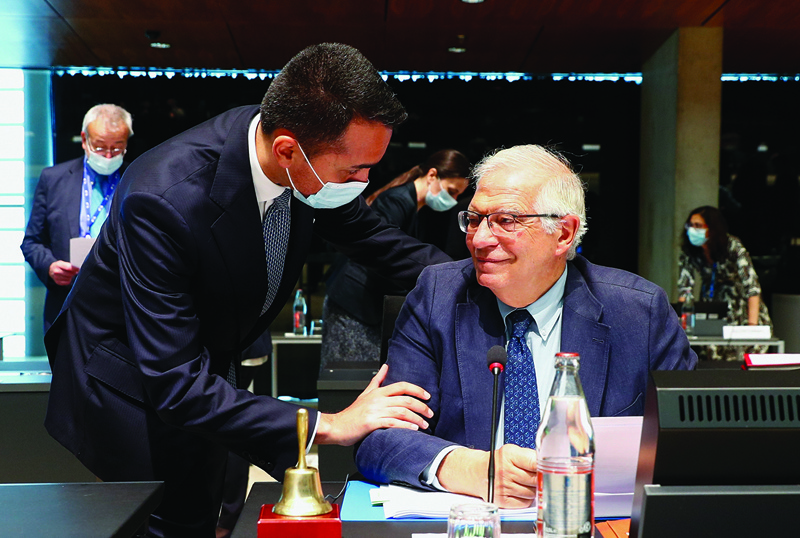 LUXEMBOURG: Italian Foreign Minister Luigi Di Maio speaks with European Union Foreign Policy Chief Josep Borrell during a European Union Foreign Ministers meeting, in Luxembourg, yesterday.-AFP
LUXEMBOURG: Italian Foreign Minister Luigi Di Maio speaks with European Union Foreign Policy Chief Josep Borrell during a European Union Foreign Ministers meeting, in Luxembourg, yesterday.-AFPWASHINGTON: The United States yesterday imposed sanctions on dozens of Belarusian officials in a coordinated move with Western allies to hit strongman Alexander Lukashenko after the forced landing of a commercial plane. "These coordinated designations demonstrate the steadfast transatlantic commitment to supporting the Belarusian people's democratic aspirations," Secretary of State Antony Blinken said in a statement.
The Treasury Department said it was freezing any US assets and barring any transactions with 16 individuals and five entities including Lukashenko's press secretary, Natallia Mikalaeuna Eismant. The State Department said it was also banning travel to the United States by 46 Belarusian officials.
The United States already imposed a slew of sanctions on Belarusian state-owned companies in May after authorities forced a Ryanair flight to land in Minsk by alleging a bomb threat and arrested a passenger, 26-year-old opposition journalist and activist Roman Protasevich. The latest sanctions were taken in coordination with the European Union, Britain and Canada.
The EU yesterday put seven Belarusian officials, including the ministers of defense and transport to an asset freeze and visa ban blacklist over the forced landing of a Ryanair plane. The bloc also added a further 71 individuals-including Russian tycoon Mikhail Gutseriyev, Lukashenko's son Dmitry and daughter-in-law Liliya-for ties to the government's sweeping crackdown on opposition or supporting the regime, the EU's officials journal said.
The EU foreign ministers also yesterday agreed sanctions on key sectors of the Belarus economy as the bloc ratchets up pressure on President Alexander Lukashenko after the forced landing of an airliner, diplomats said. Ministers meeting in Luxembourg backed broad-ranging measures targeting major revenue sources for the Belarusian regime: potash fertilizer exports, the tobacco industry, petroleum and petrochemical products, and the financial sector, diplomats told AFP.
Officials said the measures-including a ban on sales of surveillance equipment to Belarus and tightening of an arms embargo-should be formally adopted by the 27-nation bloc in the coming days. Ministers also formally signed off on placing 86 additional individuals and entities in Belarus on an assets freeze and visa ban blacklist, with the names to be published in the EU's official journal later in the day.
"We want to contribute in this way to the financial drying up of this regime." EU foreign policy chief Josep Borrell had earlier said the sanctions should be wrapped up after a summit of the bloc's leaders in Brussels later this week. "Sanctions are a way of putting pressure on the government of Belarus," Borrell told journalists. "We're going to hurt the economy of Belarus heavily."
'No silver bullet'
Belarusian strongman Lukashenko sparked international outrage by dispatching a fighter jet on May 23 to intercept the Ryanair plane flying from Greece to Lithuania. When the plane was forced to land in Minsk, Belarus arrested dissident journalist Roman Protasevich and his girlfriend Sofia Sapega on board. Last year, the EU slapped sanctions on 88 individuals-including Lukashenko and his son-over a brutal crackdown on protests since the veteran leader claimed victory at elections in August deemed fraudulent by the West.
Lukashenko, ruler of Belarus since 1994, has so far shrugged off the pressure with backing from his key ally Russia. Ahead of their discussions, EU ministers met with exiled Belarusian opposition leader Svetlana Tikhanovskaya, who insists she rightfully won last year's poll.
"Sanctions aren't a silver bullet but they can help to end violence and release people," Tikhanovskaya wrote on Twitter. Lithuania's Foreign Minister Gabrielius Landsbergis said he would also raise with EU counterparts the issue of a sudden spike in migrants, mostly Iraqis and Syrians, crossing over into the country from Belarus. Landsbergis accused the Belarusian authorities of funneling the migrants through to hit back at its neighbor for leading the push to punish Minsk.
He warned the flow could increase after sanctions were approved and that Lithuania "might need help and assistance from other European countries". By approving sanctions on potash fertilizers and petroleum and petrochemical products, European Union foreign ministers are targeting two mainstays of the Belarus economy. The sanctions-to be formally adopted by the 27-nation bloc in the coming days-target major sources of revenue for the regime of Alexander Lukashenko.
Potash
Belarus is the world's second-largest exporter of potash fertilizers after Canada, according to the World Bank, with sales in 2018 worth $2.8 billion. State group Belaruskali says it produces around a fifth of the world's potash fertilizer and employs 16,000 people.
Exports are an important source of foreign currency for the state-controlled economy. Most Belarusian potash is exported to Brazil, China and India, but Poland and Belgium are also major clients. Production was suspended several times at the Belaruskali potash plant as workers joined strikes during last year's post-election protests against Lukashenko.
Petroleum products
Belarus does not have its own hydrocarbon reserves but oil and gas still play a major role in its economy. The country benefits from preferential prices for Russian crude and has maintained refineries and pipelines built when it was part of the Soviet Union.
Refined petroleum products are Belarus's biggest export, worth $6.5 billion in 2019. Its main clients are Ukraine, which bought $2.5 billion worth that year, and Britain, which bought $2.2 billion worth. Three EU countries followed: Germany, the Netherlands and Poland which together accounted for more than $1.5 billion in purchases. Belarus also controls a series of pipelines carrying Russian oil and gas to Europe, but the EU does not yet appear to be targeting the network, which provides Minsk with significant transit fees. - AFP










